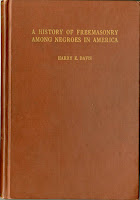Over the last decade author Dan Brown has brought historical subjects of intrigue into the realm of popular culture with novels such as The Da Vinci Code. Through his written works and film adaptations the general public has become familiar with the Holy Grail, the Knights Templar and Priory of Sion, the Illuminati, and most recently, the Freemasons. While Brown’s latest work, The Lost Symbol, gave readers a lesson in the history of freemasonry, it left out a vital chapter of the fraternal society’s history—African Americans. As with many institutions in the United States, freemason lodges were segregated. As a result, African American freemasons organized their own branch under Prince Hall Freemasonry.
 Prince Hall Freemasonry is named after Prince Hall, one of the first African American freemasons. In 1775 Hall, along with fourteen other African American men, were initiated by a British military lodge stationed in Boston, MA. Under Hall’s leadership and over time, the first African American lodge, whose original title is argued to be African Lodge No.1 or No.459, gained recognition by the Grand Lodge of England and was given the full rights of a Masonic grand lodge. After the American Revolution, the lodge remained loyal to English counterparts because U.S. Freemasons refused to accept it. However, the Grand Lodge of England provided little support, which led what was then the African Lodge No.1 to declare independence in 1827.
Prince Hall Freemasonry is named after Prince Hall, one of the first African American freemasons. In 1775 Hall, along with fourteen other African American men, were initiated by a British military lodge stationed in Boston, MA. Under Hall’s leadership and over time, the first African American lodge, whose original title is argued to be African Lodge No.1 or No.459, gained recognition by the Grand Lodge of England and was given the full rights of a Masonic grand lodge. After the American Revolution, the lodge remained loyal to English counterparts because U.S. Freemasons refused to accept it. However, the Grand Lodge of England provided little support, which led what was then the African Lodge No.1 to declare independence in 1827. Prince Hall lodges remained in Northern states until after the Civil War, since up to that point only free African Americans had the independence to establish lodges. Even after Emancipation, Prince Hall Freemasonry strove to be acknowledged by white Masonic lodges in the North and South. This effort continued into the twentieth century, and today the majority of grand lodges recognize Prince Hall Freemasonry. Like their white counterparts, Prince Hall Masons saw the development of related organizations, such as the Order of the Eastern Star, which inducted both men and women. While not a Masonic organization, members are admitted based on their relation to a brother of the Freemasons. The African American Order of the Eastern Star was founded in 1874 by Thornton Andrew Jackson, a Prince Hall Mason in Washington, D.C.
Prince Hall lodges remained in Northern states until after the Civil War, since up to that point only free African Americans had the independence to establish lodges. Even after Emancipation, Prince Hall Freemasonry strove to be acknowledged by white Masonic lodges in the North and South. This effort continued into the twentieth century, and today the majority of grand lodges recognize Prince Hall Freemasonry. Like their white counterparts, Prince Hall Masons saw the development of related organizations, such as the Order of the Eastern Star, which inducted both men and women. While not a Masonic organization, members are admitted based on their relation to a brother of the Freemasons. The African American Order of the Eastern Star was founded in 1874 by Thornton Andrew Jackson, a Prince Hall Mason in Washington, D.C.For researchers interested in the history and culture of African American freemasonry and that of similar organizations, AARL’s archives contains collections related to Prince Hall Freemasonry and the Order of the Eastern Star. By and large, these records document Atlanta and Georgia chapters during the twentieth century. The Selena Sloan Butler family papers contain materials related to Dr. Henry Rutherford Butler Sr, who was the grand master of the Most Worshipful Prince Hall Grand Lodge of Georgia from 1901 to 1931. Other collections that document such groups include the Henry J. and Florine D. Furlow papers and the Douglas Evans/Prince Hall Masons collection. The Vertical Files, which inspire the “Treasures from the Vertical Files” series, also contain a handful of items, though they represent lodges in other states.
ADDENDUM: Please see archives staff regarding use/access restrictions.
References:
Butler, Henry Rutherford. The History of Masonry Among Colored Men in Georgia. Atlanta, GA, 1911. (AARL owns a copy)
Davis, Harry E. A History of Freemasonry Among Negroes In America. The United Supreme Council, Ancient & Accepted Scottish Rite of Freemasonry, North Jurisdiction, USA (Prince Hall Affliation), 1946. (AARL owns a copy)
Mjagkij, Nina. Organizing Black America: An Encyclopedia of African American Associations. New York: Garland Publishing, Inc., 2001.
Walkes, Joseph A. Black Square and Compass: 200 Hundred Years of Prince Hall Freemasonry. Macoy Publishing and Masonic Supply Co., 1981.
Williams, Loretta. Black Freemasonry and Middle Class Realities. Columbia, MO: University of Missouri Press, 1980.
Williams, Loretta. Black Freemasonry and Middle Class Realities. Columbia, MO: University of Missouri Press, 1980.
Posted by Nicole Carmolingo, AARL Archives intern



No comments:
Post a Comment